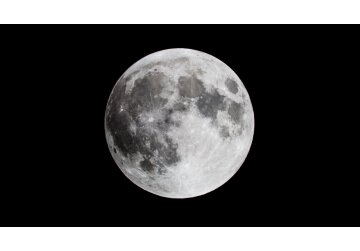
The moon could get its own time zone, but clocks work differently there – here's why
Dozens of lunar missions are planned for the years ahead, with the need for time-keeping on the moon becoming essential for different space organisations to work together.
Most of us have at some point stopped to gaze up at the moon - but have you ever wondered what time it is up there?
For those who have, their question may soon have an answer, as space organisations are considering giving the moon its very own time zone.
Dozens of lunar missions, including ones to build bases and other habitats on the moon, are planned for the decade ahead, the European Space Agency (ESA) has said.
Space organisations began discussions about lunar time-keeping at the ESA's ESTEC technology centre in the Netherlands in November 2022.
ESA navigation system engineer Pietro Giordano said: "We agreed on the importance and urgency of defining a common lunar reference time, which is internationally accepted and towards which all lunar systems and users may refer to.
"A joint international effort is now being launched towards achieving this."
Up until now, each new mission to the moon has been operated on its own timescale, with deep space antennas used to keep onboard chronometers synchronised with the time on Earth.
Beyond astronauts and ground controllers being able to tell the time on the moon, the need for standard time-keeping in space is also essential for guidance and navigation.
Just as GPS systems on Earth require precise coordination and timing, so too will any infrastructure that is built and operated on the moon.
NASA's Gateway station will serve as a multi-purpose outpost orbiting the moon when it begins operating sometime after November 2024.
It will be open to astronaut stays and provide support for humans to return to the moon's surface.
Meanwhile, the ESA will be putting down its own Argonaut lander on the moon.
These missions will not only be operating on or around the moon at the same time - they will also be interacting and potentially relaying communications for one another and performing joint observations.
The ESA has said that among the current topics under debate is whether a single organisation should be responsible for setting and maintaining lunar time, and whether it should be set on an independent basis or be kept synchronised with Earth.
The international team working on the subject will face "considerable technical issues", the ESA has said.
Why do clocks work differently on the moon?
One challenge is that clocks on the moon run faster than their equivalents on Earth, as clocks tick slower in stronger gravitational fields, therefore gaining around 56 microseconds or millionths of a second per day.
Their exact rate depends on their position on the moon, ticking at a different speed on the lunar surface than when they are in orbit.
Bernhard Hufenbach, a member of the Moonlight Management Team from ESA's Directorate of Human and Robotic Exploration, said: "Of course, the agreed time system will also have to be practical for astronauts.
"This will be quite a challenge on a planetary surface where in the equatorial region each day is 29.5 days long, including freezing fortnight-long lunar nights, with the whole of Earth just a small blue circle in the dark sky.
"But having established a working time system for the moon, we can go on to do the same for other planetary destinations."
news.sky.com







